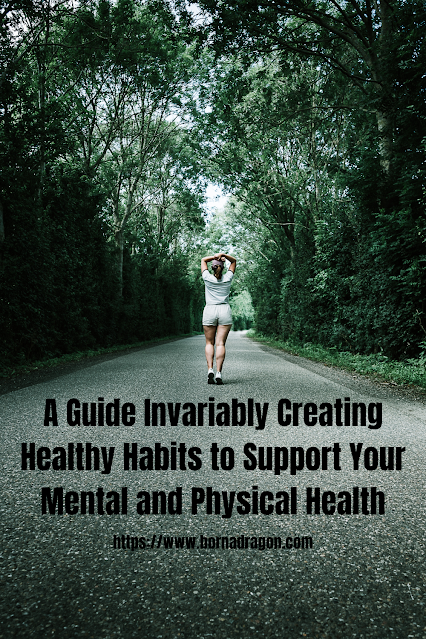Supporting your mental and physical health is vital to living a happy, healthy life. It may seem daunting at first, but with the right knowledge and approach, it can be easy to establish an effective routine that will help improve your overall well-being. In this guide, you will find out how to create healthy habits that can support your mental and physical health and provide tips on how to stick with them in the long run.
Creating Healthy Habits:
The first step towards improving your mental and physical health is creating healthy habits that will provide sustained benefits over time. Small changes, such as drinking more water each day or getting up earlier in the morning, can have a big impact if done consistently. Here are some ideas for creating healthy habits:
• Exercise regularly. Aim for 30 minutes of physical activity a day, such as running, walking, or cycling, and make sure to switch it up, so you don’t get bored.
• Eat more fruits and vegetables. Make an effort to include fruits and veggies in at least three meals daily as they are packed with essential vitamins and minerals that will boost your energy levels and keep you feeling healthy overall.
• Get enough sleep. Sleep is important for mental and physical health, with 7-9 hours being the recommended amount each night. Try to go to bed simultaneously each night and avoid using screens before going to sleep.
• Drink plenty of water. Staying hydrated is key to good health and proper functioning. Ensure you’re drinking enough water throughout the day, ideally around 2 liters a day.
• Take time for yourself. Setting aside time each day to do something that relaxes and calms you is important for mental health. This could be anything from reading a book or doing some yoga to taking a walk or drawing/painting.
Understanding Unhealthy Habits:
We all have unhealthy habits. Whether it be eating too much, smoking cigarettes, drinking alcohol, or staying up late, these behaviors can completely negatively alter our lives and health. Unhealthy habits can lead to physical and mental illnesses such as depression and anxiety. They can also lead to financial difficulties and relationship issues. Therefore, it is important to recognize the signs of an unhealthy habit and take steps to correct the behavior before it gets out of hand.
The first step in understanding unhealthy habits is recognizing the signs that you may be engaging in one. Common symptoms include feeling overwhelmed or overly exhausted, neglecting relationships due to being too busy with other activities, relying on artificial stimulants like caffeine or sugar for energy boosts, and avoiding activities that were once enjoyable. Additionally, if you feel like you are unable to control the habit or find yourself constantly engaging in the behavior despite its negative consequences, it is likely unhealthy.
Once these signs of an unhealthy habit have been identified, it is important to take action to break it. This can be done by making small, gradual lifestyle changes. For example, if you have a habit of eating unhealthy foods late at night, start by cutting back on the quantity or replacing certain items with healthier options. Additionally, setting aside specific times for engaging in the behavior can help limit its frequency and duration.
Facing Insecurities With Solutions:
Insecurities can be difficult to face and address. They are often rooted in fear, worry, and self-doubt. If left unchecked, they can prevent us from achieving our goals or even engaging in everyday activities. Therefore, it is important to confront these fears head on and create solutions that will help you manage them.
The best way to do this is by identifying the source of the insecurity and understanding why it exists. Is it because of a negative past experience? A lack of certain skills or abilities? Poor self-esteem? Once you understand the root cause of your insecurity, you can begin creating valid solutions that tackle it at its core.
For example, if you suffer from atopic dermatitis, you may feel self-conscious about it. To address this, you may try to educate yourself on the condition and the available treatments that can help manage its symptoms. Additionally, certain lifestyle modifications such as avoiding triggers, exercising regularly, eating a healthy diet, and using adbry can help control flare-ups.
Our habits and insecurities can have a significant impact on our lives. It is important to be aware of the signs of unhealthy behaviors and take steps to break them. Additionally, by understanding the source of our insecurities and creating solutions that tackle them at their core, we can better manage them. By taking these steps, we can live healthier.


No comments:
Post a Comment
Feel free to share your thoughts. However, kindly refrain from adding links in your comments because they will be marked as spam and filtered out. Thank you!